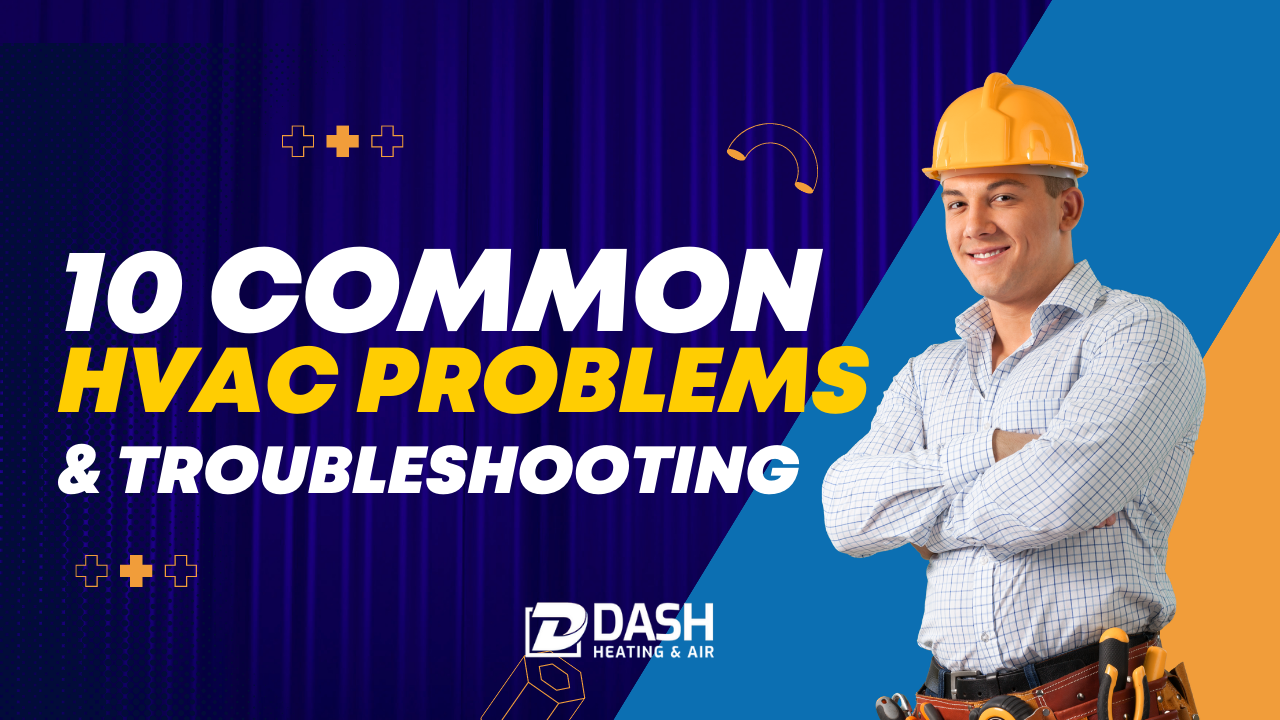10 Common HVAC Problems and How to Troubleshoot Them

Heating, Ventilation, and Air Conditioning (HVAC) systems are essential in ensuring comfortable indoor temperatures. Like any other machine, however, HVAC systems can have problems that
cause discomfort, unexpected energy bills, or worse, breakdowns. This article will identify ten common HVAC problems and their solutions.
1. Lack of Maintenance
Neglecting regular maintenance can cause a lot of problems for your HVAC system, so it’s essential to spend time taking care of it. If you ignore regular cleaning, filter replacement, and
inspection, sludge can form, vents can become clogged, and critical components like the compressor can malfunction. Make sure to make time for regular maintenance tasks like cleaning or replacing air filters, wiping down internal components, and annual professional inspections, to avoid large repair costs and reduce energy consumption all year long.
2. Dirty or Clogged Air Filters
Air filters in the HVAC system play a critical role in maintaining indoor air quality by preventing dust, dirt, and other particles from entering your home. A dirty or clogged air filter can have severe consequences, including reducing the airflow of your HVAC system, causing the evaporator coil to freeze, or, worst of all, damaging your system’s compressor. Regular
replacement of your air filters once every 30 to 90 days, depending on the air filter type and usage, will prevent these issues from happening.
3. Thermostat Problems
The thermostat is the control panel for your HVAC system. When it fails, it can create a lot of problems. Check for issues such as a broken or inaccurate sensor, loose wiring, dead batteries, or any physical damage to the thermostat. If left unresolved, it can make it challenging to maintain the desired temperature or cause the HVAC system to fail altogether. Make sure to inspect the thermostat regularly and call professional HVAC companies to take care of the problem.
4. Dirty or Clogged Condenser Coils
The outdoor unit of your HVAC system has condenser coils that transmit heat from the refrigerant to the outside air. Over time, condenser coils can get dirty, severely affecting their ability to dissipate hot air. When this happens, your HVAC system will run less efficiently and cause problems like compressor failure. Regular cleaning of the condenser coils with a hose or by an air compressor will extend the lifespan of your HVAC system.
5. Refrigerant Leaks
Refrigerant is essential in maintaining the operation of your air conditioning system. When a refrigerant leak happens, your HVAC system will not be able to keep up with the temperature demands of your home. Common signs of a refrigerant leak include reduced airflow, warm air coming from grilles, or ice forming on the evaporator coil. Don’t try to fix a refrigerant leak
yourself; call a professional HVAC company that specializes in refrigerant leak repairs.
6. Broken Capacitors
A capacitor is a primary component that aids in starting the compressor motor and the fan motor in your HVAC system. A broken capacitor can cause your system to fail completely. Indications of a faulty capacitor include humming sounds or intermittent starting of your HVAC system. If you suspect the capacitors are the problem, call a professional to replace them.
7. Failed Compressor
The compressor is the heart of your HVAC system. Its primary function is to keep the refrigerant flowing through the system, ensuring that the temperature of the air is adjusted accordingly. Signs of a failed compressor include a loud knocking sound, warm air coming from the vents, and your system failing to maintain your ideal temperature. If you notice these symptoms, make sure to call a professional HVAC technician immediately.
8. Malfunctioning Evaporator Coil
The evaporator coil absorbs heat from the indoor air, making it essential to the cooling function of your HVAC system. If the evaporator coil malfunctions, your HVAC system will not be able to cool your home or business properly. Signs of an issue with the evaporator coil include a reduction in airflow and air conditioning power. To avoid this problem, make sure that regular maintenance is provided and that the coil is cleaned regularly to prevent issues.
9. Leaking Ductwork
Duct leaks can have a massive impact on your HVAC system’s efficiency and health. Leaking ducts lead to hot and cold spots in your home, high energy bills, and poor indoor air quality. Improper installation or wear over time are two common causes of duct leaks. Consider hiring an HVAC professional to inspect your ducts for problems and issues with leaky ducts.
10. Ignored Strange Sounds
HVAC systems sometimes make unusual buzzing or clunking sounds. Ignoring these sounds can cause serious damage to your system. Every HVAC system makes different sounds, but common indicators of a severe problem include grinding noises or loud knocking sounds. Noticing this type of noise requires you to take a proactive step to invest in professional maintenance to avoid costly repairs, and in some cases, even complete replacement of your HVAC system.
Conclusion:
To avoid system failure and costly repairs, it is essential to take HVAC maintenance seriously. These ten common problems can be easily avoided with regular cleaning and maintenance by professionals. If you notice any of these symptoms, don’t ignore them. Call a local HVAC professional today to diagnose and repair any issues with your HVAC system. A healthy and efficient HVAC system will save you money on your energy bills while keeping you and your family safe and comfortable all year long.
